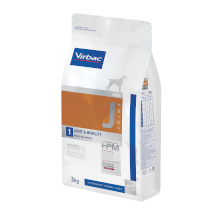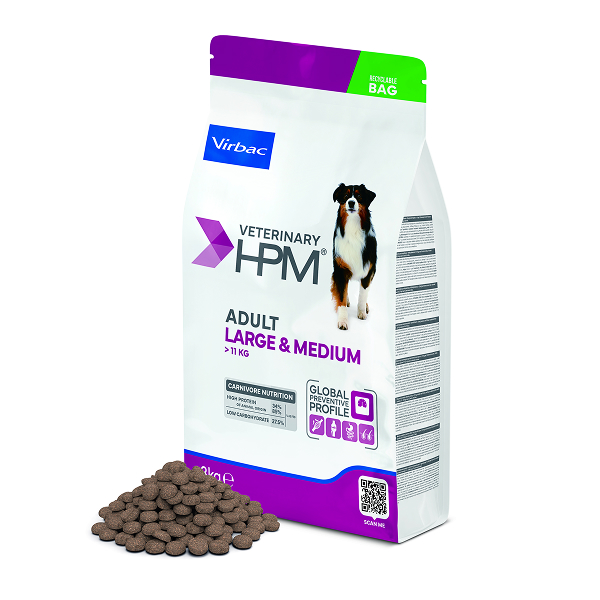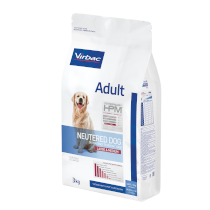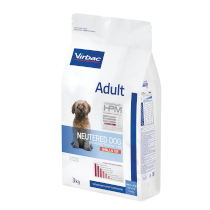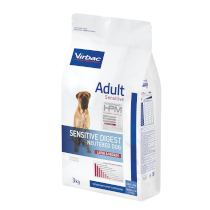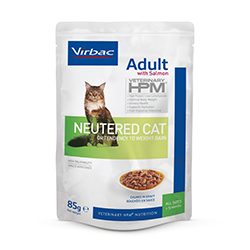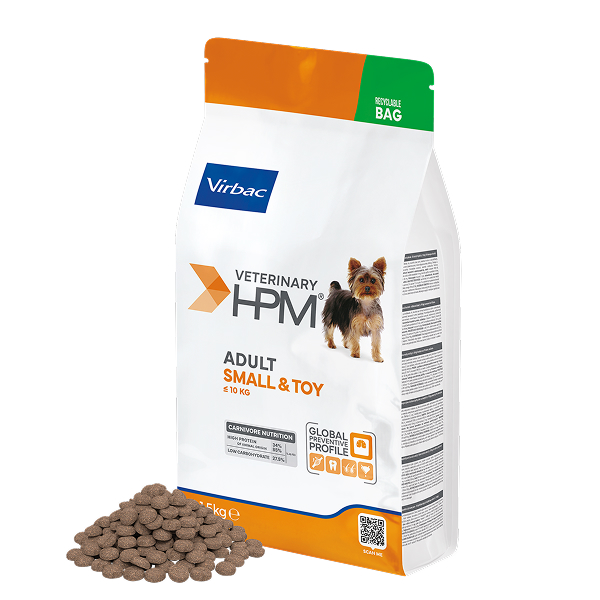Joint & Mobility
Support of the metabolism of joints in the case of osteoarthritis
Health benefits
- Action on the inflammatory and painful processes in joint
- Weight control to limit mechanical stress on the joints
- Strong muscle to support joints and mobility
- Cartilage integrity support (Mobility plus complex)
- Protection of the digestive mucosa that can be altered by the use of anti-inflammatories (Sepiolite)
Available sizes:
- 3 kg
- 12 kg
Nutrion for carnivorious paragraph
Composition :
Dehydrated pork and poultry proteins, rice, faba bean hulls, hydrolysed pork and poultry proteins, lignocellulose, peas, linseed, fish oil, potato starch, animal fats, minerals, fructo-oligosaccharides, psyllium fibre (Plantago (L.) spp.), brewers yeast, beet pulp, chondroitin sulfate, hydrolysed crustacean (source of chitosan), Lactobacillus acidophilus.
Analytical Constituents :
(% as fed)
VETERINARY HPM® contains no artificial flavours or colours.
| Analytical Constituents (% as fed) |
|
|---|---|
| Moisture | 9 % |
| Proteins | 34 % |
| Animals to vegetable protein ratio | 85/15 |
| Fats | 15 % |
| Minerals | 6,5 % |
| Crude Cellulose | 9 % |
| Total Dietary Fibre | 15 % |
| ENA * | 26,5 % |
| Starch | 18 % |
| Total sugar | 1 % |
| Calcium | 0,9 % |
| Phosphore | 0,7 % |
| Omega-6 | 2 % |
| Omega-3 | 3 % |
| EPA | 0,6 % |
| EM** calculée | 353 kcal/100g |
| EM** mesurée in vivo | 335 kcal/100g |
| * Extractif Non Azoté : glucides assimilables ** Energie métabolisable |
|
| Added functional ingrédients | |
|---|---|
| Bentonite | 0,5 % |
| Pasteurised Lactobacillus acidophilus | 7 mg/kg |
| L-carnitine | 330 mg/kg |
| Chitosan | 1 240 mg/kg |
| Sulfate de chondroïtine | 1 240 mg/kg |
| Added Vitamins and Trace Minerals | |
|---|---|
| Vitamin A | 11 600 IU/kg |
| Vitamin D3 | 1 100 IU/kg |
| Vitamin E | 570 mg/kg |
| Vitamin B1 | 3,8 mg/kg |
| Vitamin B2 | 11 mg/kg |
| Vitamin B3 | 30 mg/kg |
| Vitamin B5 | 26 mg/kg |
| Vitamin B6 | 3 mg/kg |
| Vitamin B9 | 0,48 mg/kg |
| Vitamin B12 | 0,062 mg/kg |
| Choline | 740 mg/kg |
| Taurine | 1 500 mg/kg |
| Copper | 15 mg/kg |
| Iodine | 1,1 mg/kg |
| Zinc | 120 mg/kg |
It is advisable to follow the ration table and to provide fresh drinking water.
| Body Weight (kg) | Daily Ration (g/day) | ||
|---|---|---|---|
| Overweight (soft weight loss) | Normal* | Skinny | |
| 3 | 60 | 80 | 85 |
| 5 | 55 | 110 | 125 |
| 8 | 120 | 150 | 170 |
| 10 | 140 | 175 | 195 |
| 15 | 180 | 225 | 255 |
| 20 | 220 | 275 | 310 |
| 25 | 255 | 320 | 360 |
| 30 | 290 | 360 | 405 |
| 40 | 350 | 435 | 490 |
| 60 | 455 | 570 | 645 |
|
*Adult dog with optimal body weight and normal physical activity The daily ration is based on the dog’s CURRENT bodyweight, and must be adjusted every month, or every week in the case of weight loss. |
|||
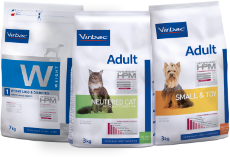
- Can I feed my puppy with a home-made diet?
The food that puppies receive throughout their first year must obviously provide energy and materials to build the skeleton, muscles, and all new tissues. But nutrition does not stop there, it must also help puppies develop a fully functioning nervous system and effective immune system. Any deficiency in essential nutrients (those which cannot be synthesized by the animal's body) during this very delicate period may affect the dog's future health.
Many recipes developed by veterinary nutritionists are available for owners who wish to prepare a nutritionally balanced home-made diet for their puppy dog food needs. However, it is illusory to succeed in respecting all the required conditions because the nutritional balance of a household ration is subject to various hazards. The owner will always find it difficult to follow the recipe exactly, the necessary ingredients are not always available, and the nutritional composition of the ingredients can vary considerably depending on the origin of the product. When preparing a home-made diet, no laboratory analysis can verify the nutritional composition of the raw materials used!
Therefore, even when accompanied by the distribution of a mineral and vitamin supplement, home-made diets for dogs often show deficiencies in some essential nutrients. For a safer and more balanced alternative, consider feeding your pet a high protein food for puppies designed to support proper development. Commercially prepared dry puppy food options are often the best puppy dog food choices for consistency and reliability.
- Can I feed my puppy with a vegetarian diet?
The dog is a carnivore, which means that certain nutrients it needs cannot be provided by a plant-based diet. Such diets can cause major nutritional deficiencies with serious consequences on health. For this reason, a puppy should never be fed a vegetarian diet. Instead, opt for puppy dog food that meets its natural dietary requirements—particularly high protein food for puppies in a dry puppy food form that is considered among the best puppy dog food options.
- Can I feed my puppy with raw meat diets?
Raw meat diets (red meat or chicken) are often deficient in calcium and phosphorus. The Calcium/Phosphorus ratio is totally inappropriate for the canine species, especially in terms of bone growth. Such a diet can cause major nutritional deficiencies with serious consequences on health. For example, when fed exclusively a raw meat diet, the puppy is exposed to the risk of pathologic fractures following minor trauma.
To avoid these risks, it is advisable to feed your pup a scientifically balanced dry puppy food. These formulas are designed as high protein food for puppies and are considered by many veterinarians as the best puppy dog food to ensure long-term health and development.

more than 6 vets out of 10 recommend our food
(source: GIE AC 2020 survey, 1519 responses)

on average, our food is rated above 4/5
(source: * conso animo, shopmium, que choisir and 60 millions conso)

94% acceptance for medium and large dogs, 92% for small and very small dogs and 84% for cats


